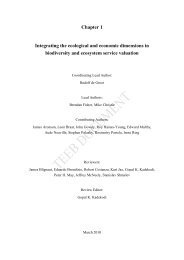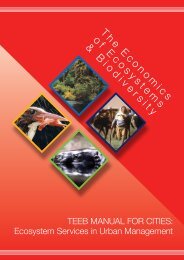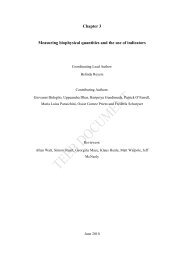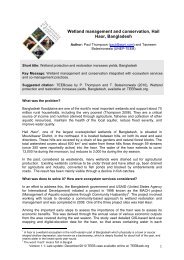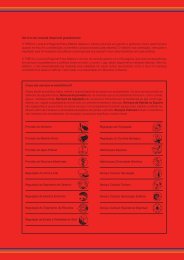Download (PDF, 6.71MB) - TEEB
Download (PDF, 6.71MB) - TEEB
Download (PDF, 6.71MB) - TEEB
Create successful ePaper yourself
Turn your PDF publications into a flip-book with our unique Google optimized e-Paper software.
2.1<br />
FRAMEWORK AND GUIDING PRINCIPLES FOR THE POLICY RESPONSE<br />
Why IS BIoDIvERSITy NEGLECTED<br />
IN DECISIoN-MAKING?<br />
Biodiversity policy is not a new field. In recent<br />
decades, nearly all countries have adopted targets and rules<br />
to conserve species and habitats and to protect the environment<br />
against pollution and other damaging activities. Policies<br />
and measures that have positively affected biodiversity<br />
and ecosystem services can take a wide variety of<br />
forms (see Box 2.1).<br />
BOX 2.1: Examples of policies that have<br />
provided biodiversity conservation benefits<br />
• Growth of protected area systems in developed<br />
and developing countries;<br />
• Development of integrated water resource ma<br />
nagement (e.g. EU Water framework Directive);<br />
• Legal recognition of liability for environmental<br />
damage (e.g. for oil spills);<br />
• Incentives to reward biodiversity management<br />
(e.g. payments for ecosystem services in<br />
Costa Rica);<br />
• Protection of critical habitats (e.g. through the<br />
Natura 2000 network, EU habitats Directive);<br />
• Market based instruments (e.g. green tax transfer<br />
scheme between states in Brazil, wetland<br />
mitigation banking in US);<br />
• Regulations to stop or limit the release of pollutants<br />
into rivers and groundwater systems,<br />
improve air quality and reduce the emissions<br />
of greenhouse gases (GhG) into the atmosphere.<br />
Despite this progress, the scale of the global biodiversity<br />
crisis (see Chapter 1) shows that current policies are<br />
simply not enough to tackle the problem efficiently.<br />
Some of the reasons are only too familiar to policy-makers,<br />
such as lack of financial resources, lack of capacity, information<br />
and/or expertise, overlapping mandates and weak enforcement.<br />
But there are also more fundamental economic<br />
obstacles in this policy field which we need to understand<br />
to make meaningful progress.<br />
A root cause of the systematic neglect of ecosystems<br />
and biodiversity in economic and development policy is<br />
their characterisation as a public and often global good:<br />
• benefits take many forms and are widespread,<br />
which makes it difficult to ‘capture’ value and ensure<br />
that beneficiaries pay for them. for example, a forest<br />
provides local benefits to local people (timber, food,<br />
other products); the forest ecosystem mediates<br />
water flows and provides regional climate stability; and<br />
forests are globally important because they sustain<br />
biodiversity and act as long-term carbon sinks;<br />
• existing markets and market prices only capture<br />
some ecosystem services (e.g. ecotourism, water<br />
supply). More commonly, individuals and businesses can<br />
use what biodiversity provides without having to pay for<br />
it, and those providing the service often don’t get due<br />
recompense;<br />
• costs of conservation and restoration are paid<br />
immediately, often at local level, yet many benefits<br />
occur in the future. for example, creating a protected<br />
area to save endangered species can cause short-term<br />
losses to user groups, which may lead us to give little<br />
or no weight to the possible long-term benefits (e.g.<br />
discovery of medicinal traits in such species).<br />
further factors include:<br />
• uncertainty about potential future benefits is<br />
matched by ignorance about the risks of inaction.<br />
We know too little about why each species is important,<br />
what its role in the food web is, what could happen if it<br />
goes extinct and the ‘tipping points’ of different ecosystems.<br />
Uncertainties lead policy makers to hesitate:<br />
spending money on policies with clear returns seems<br />
preferable to spending on policies with less assured<br />
outcomes;<br />
<strong>TEEB</strong> foR NATIoNAL AND INTERNATIoNAL PoLICy MAKERS - ChAPTER 2: PAGE 4



